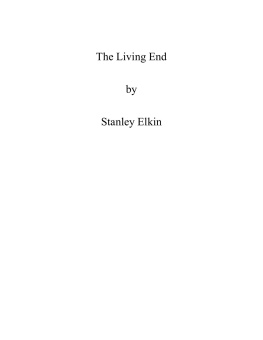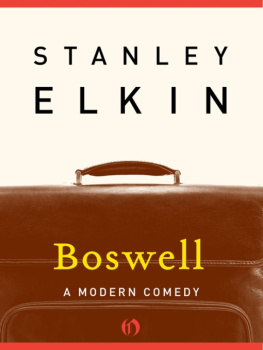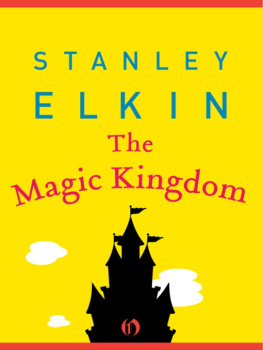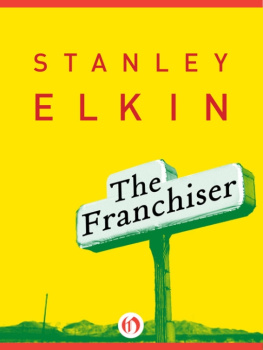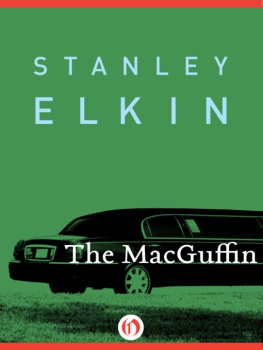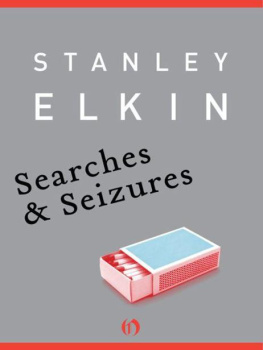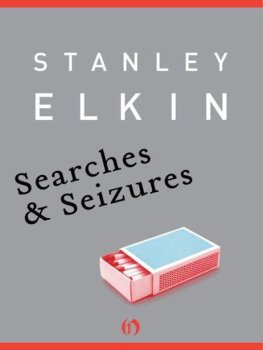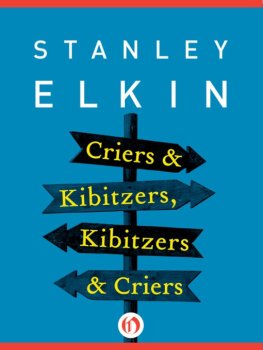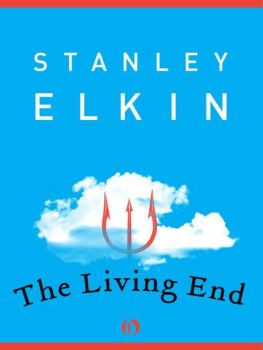The Living End
by
Stanley Elkin
ALSO BY STANLEY Elkin
Boswell Criers and Kibitzers, Kibitzers and Criers
A Bad Man
The Dick Gibson Show
Searches and Seizures
Franchiser
The three sections of this book first appeared, in slightly different form, respectively in American Review, Antaeus, and Tri Quarterly
Copyright 1977, 1978, 1979 by Stanley Elkin All rights reserved Printed in the U.S.A.
No part of this publication may be reproduced or transmitted in any form or by any means, electronic or mechanical, including photocopy, recording or any information storage and retrieval system now known or to be invented, without permission in writing from the publisher, except by a reviewer who wishes to quote brief passages in connection with a review written for inclusion in a magazine, newspaper or broadcast For information contact:
E.P. Dutton, 2 Park Avenue, New York, N.Y. 10016
Library of Congress Cataloging in Publication Data Elkin, Stanley The living end A Henry Robbins book
ISBN: 0-525-07020-6 Published simultaneously in Canada by Clarke, Irwin & Company Limited, Toronto and Vancouver Designed by The Etheredges -First Edition.
To Joan
JUL 24 1979
Part I THE CONVENTIONAL WISDOM
Part II THE BOTTOM LINE
Part III THE STATE OF THE ART
Part I The Conventional Wisdom
Ellerbee had been having a bad time of it. Hed had financial reversals. Change would slip out of his pockets and slide down into the crevices of other peoples furniture. He dropped deposit bottles and lost money in pay phones and vending machines. He overtipped in dark taxicabs. He had many such financial reversals. He was thick with Super Bowl tickets when he was suddenly called out of town and with theater and opera tickets when the ice was too slick to move his car out of his driveway. But all this was small potatoes. His portfolio was a disgrace. He had gotten into mutual funds at the wrong time and out at a worse. His house, appraised for tax purposes at many thousands of dollars below its replacement cost, burned down, and recently his once flourishing liquor store, one of the largest in Minneapolis, had drawn the attentions of burly, hopped-up and armed deprivators, ski-masked, head-stockiDged. Two of his clerks had been shot, one killed, the other crippled and brain damaged, during the most recent visitation by these marauders, and Ellerbee, feeling a sense of responsibility, took it upon himself to support his clerks families. His wife reproached him for this, which led to bad feeling between them.
Werent they insured?
I dont know, May. I suppose they had some insurance but how much could it have been? One was just a kid out of college.
Whats his name, the vegetable.
Harold, May.
What about who sis He was no kid out of college.
George died protecting my store, May.
Some protection. The black bastards got away with over fourteen hundred bucks. When the police called to tell him of the very first robbery, May had asked if the men had been black. It hurt Ellerbee that this should have been her first question.
Whos going to protect you? The insurance companies red-lined that lousy neighborhood a year ago.
We wont get a penny.
Im selling the store, May. I cant afford to run it anymore.
Selling? Whod buy it? Selling!
Ill see what I can get for it, Ellerbee said.
Social Security pays them benefits, May said, picking up their quarrel again the next day.
Social Security pays up to the time the kids are eighteen years old, and they give to the widow, too.
Who do you think you are, anyway? We lose a house and have to move into one Dot half as good because its all we can afford, and you want to keep on paying the salaries not only of two people who no longer work for you, but to pay them out of a business that you mean to sell! Let Social Security handle it.
Ellerbee, who had looked into it, answered May.
Harold started with me this year. Social Security pays according to what youve put into the system.
Dorothy wont get three hundred a month, May. And Georges girl is twenty. Evelyn wont even get that much.
Idealist, May said.
Martyr.
Leave off, will you, May? Im responsible. Im under an obligation.
Responsible, under an obligation!
Indirectly. God damn it, yes. Indirectly. They worked for me, didnt they? Its a combat zone down there. I should have had security guards around the clock.
Where are you going to get all this money? Weve had financial reverses. Youre selling the store.
Wheres this money coming from to support three families?
Well get it.
Well get it? Theres no well about it, Mister. Youll. The stocks are in joint tenancy. You cant touch them, and Im not signing a thing. Not a penny comes out of my mouth or off my back.
All right, May, Ellerbee said.
Ill get it. In fact Ellerbee had a buyer in mind-a syndicate that specialized in buying up businesses in decaying neighborhoods-liquor and drugstores, small groceries-and then put in ex-convicts as personnel, Green Berets from Vietnam, off-duty policemen, experts in the martial arts. Once the word was out, no one ever attempted to rob these places. The syndicate hiked the price of each item at least 20 percent-and got it. Ellerbee was fascinated and appalled by their strong arm tactics. Indeed, he more than a little suspected that it was the syndicate itself which had been robbing him-all three times his store had been held up he had not been in it-to inspire him to sell, perhaps.
We read about your trouble in the paper, Mr. Davis, the lawyer for the syndicate, had told him on the occasion of his first robbery. The thieves had gotten away with $300 and there was a four-line notice on the inside pages.
Terrible, he said, terrible. A fine old neighborhood like this one. And its the same all over America today. Everywhere its the same story. Even in Kansas, even in Utah. They shoot you with bullets, they take your property. Terrible. The people I represent have the know-how to run businesses like yours in the spoiled neighborhoods. And then he had been offered a ridiculous price for his store and stock. Of course he turned it down. When he was robbed a second time, the lawyer didnt even bother to come in person.
Terrible. Terrible, he said.
Whoever said lightning doesnt strike twice in the same place was talking through his hat. Im authorized to offer you ten thousand less than I did the last time. Ellerbee hung up on him.
Now, after his clerks had been shot, it was Ellerbee who called the lawyer.
Awful, the lawyer said.
Outrageous. A merchant shouldnt have to sit still for such things in a democracy.
They gave him even less than the insurance people had given him for his under appraised home. Ellerbee accepted, but decided it was time he at least hint to Davis that he knew what was going on.
Im selling, he said, because I dont want anyone else to die.
Wonderful, Davis said, wonderful. There should be more Americans like you.
He deposited the money he got from the syndicate in a separate account so that his wife would have no claims on it and now, while he had no business to go to, he was able to spend more time in the hospital visiting Harold.
Hows Hal today, Mrs. Register? he asked when he came into the room where the mindless quadraplegic was being cared for. Dorothy Register was a red-haired young woman in her early twenties.
Ellerbee felt so terrible about what had happened, so guilty, that he had difficulty talking to her. He knew it would be impossible to visit Harold if he was going to run into his wife when he did so. It was for this reason, too, that he sent the checks rather than drop them off at the apartment, much as he wanted to see Hals young son, Harold, Jr. in order to reassure the child that there was still a man around to take care of the boy and his young mother.
Next page
